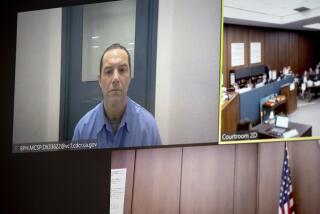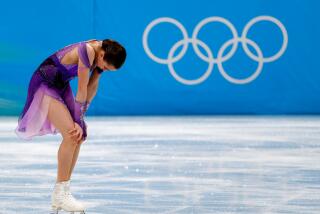USOC Considers a Confirmation Test for Angel Myers
- Share via
SEOUL — Baaron Pittenger, secretary general of the United States Olympic Committee, said Saturday the urine samples that apparently revealed the use of a banned substance by swimmer Angel Myers may be sent to another laboratory for confirmation.
But Pittenger said he believes the initial test, conducted by Dr. Don Catlin at the UCLA analytical laboratory, was accurate.
Myers qualified for the U.S. Olympic team in five events during the U.S. trials last month at Austin, Tex., but was prevented from coming to Seoul when her drug test was positive for an anabolic steroid. She said she believed the laboratory might have confused her birth control pill with a steroid.
She took her case to an arbitrator, who ruled in favor of the USOC.
“We wouldn’t do this with the idea of reinstating Angel to the Games,” Pittenger said, adding that the deadline has passed for countries to submit entries. “I think the purpose that would be served would be to satisfy the desires of Angel and her family with regard to the findings.
“This is something that the family has consistently requested.”
Pittenger said that the decision will be made within the next few days after he consults with others, indicating that an attorney would be among them. He said that he did not know whether the USOC would be exposed legally if Myers were found by a second laboratory to have been mistakenly denied a place on the team.
“I have to consider all the implications,” he said. “On the one hand, we understand the desires of the family. On the other hand, we understand the risks involved.”
Asked if it would not also benefit the USOC to discover whether the first test was analyzed correctly, Pittenger said: “I have a lot of faith in Don Catlin. I have no reason whatsoever to believe there was a mistake made in this case.”
Pittenger also said that he would welcome an International Olympic Committee proposal to standardize drug testing procedures throughout the world, including a requirement that nations test their athletes on an unannounced basis. The IOC is expected to take action on the proposal this week at its session in Seoul.
According to the proposal, athletes would be selected randomly for testing during workouts as well as competitions. In the United States, athletes are routinely informed about competitions or training sessions in which they will be tested.
There has been speculation that the U.S. legal system would not support a system of random testing because it might be considered a violation of athletes’ individual rights, but Pittenger disagreed.
“I think it’s a possibility as part of a worldwide program,” he said.
More to Read
Go beyond the scoreboard
Get the latest on L.A.'s teams in the daily Sports Report newsletter.
You may occasionally receive promotional content from the Los Angeles Times.






